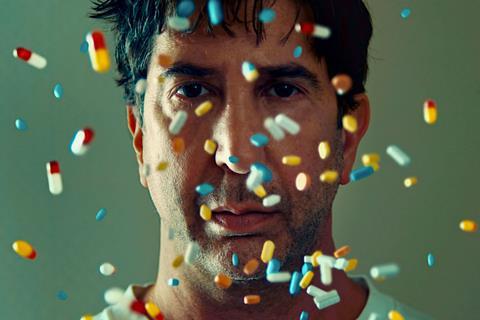David Schwimmer is a TV writer with a mid-life crisis in this uneven LA-set debut

Dir. Jack Begert. US. 2024. 110min
Little Death, the feature directorial debut of rising music video director Jack Begert (famous for his work on Olivia Rodrigo’s ’get him back!’), is really two films in one. The first is a Hollywood satire starring Friends star David Schwimmer as a sad-sack TV screenwriter and wannabe filmmaker. The second is a verité story about two down-and-out college-age kids who are trying to survive a rough night on the streets of L.A.
A peculiar two-headed beast
Created to stylistically contrast with each other in every possible way (digital vs. celluloid; sardonic vs. sensitive; white and middle-aged vs. diverse and on the cusp of adulthood), Begert has created a peculiar two-headed beast that is destined to fall short with audiences by its very own design. It is hard to see the same people who may be tickled by the dark humour of the first half being entranced by the attempts at genuineness in the second. You can applaud Begert and his high-profile supporters—producer Darren Aronofsky and executive producer Ari Handenl – for attempting this bold structural experiment that ultimately deals with the dangers of drug addiction, but it may not work in the commercial marketplace beyond a mere curiosity.
Little Death begins very much like some sardonic Charlie Kaufman-esque meta narrative about Martin (Schwimmer), a frustrated middle-aged TV writer. Full of “pitiful self-loathing,” as his unloving girlfriend (Jena Malone) points out, the heavily medicated Martin is about to get his big break. After working for 11 seasons on an NBC sitcom called ’The Switch’, about a man and woman who swap places, Martin is finally about to direct his first feature, a personal independent film based on his own childhood. There’s only one problem: the main financier wants him to change the main character from male to female. (As one of the stereotyped movie executives tells him, “No one wants to watch another white guy’s problems.”)
It is here that the first of the film’s switches take place; the next time we see Martin, he is played by female actress Gaby Hoffman. The actress does a great job of capturing the character’s (and Schwimmer’s) gloomy and angst-written mannerisms, but the gag is only a momentary gimmick in a section of the film that is intentionally full of flashy touches of artifice, surrealism, dream sequences, bursts of animation (some of it very effective), and special effects—all to evoke Martin’s anxiety-ridden and pharmaceutically altered mind.
When Martin meets a random woman who he is literally seeing in his dreams, Schwimmer returns, only to make the character further desperate and unlikeable. When Martin’s story ends, some viewers might miss the wild filmmaking, but they are unlikely to to miss the character.
We then meet Kate (Talia Ryder) and AJ (musician Dominic Fike), a couple of wayward young adults who find themselves in the middle of a heist gone wrong. Instead of getting away, they also become victims and get thrown out on the street. They go on a meandering adventure to retrieve their stolen car and goods, ending up at first a party, then a drug dealer’s apartment and finally 4am brunch at an L.A. deli.
Shot on film, with a softer color palette and an entirely different realist tone, the second part of the film feels reminiscent of Larry Clark and Sofia Coppola. (In press notes, the director mentions Robert Altman as an influence, but Begert’s aesthetic feels more contemporary).
While this section aspires to be far more genuine than the first, with Kate and AJ portrayed as real young people struggling with addiction, it is mostly the style that has changed—one that does not necessarily go any deeper. Ultimately, Begert is interested in exploring the nature of different perspectives. But while his film may dabble in varying points of view, it never manages to delve into the subjectivities of the characters it is trying to capture – even the ones it clearly cares for.
Production Companies: AC Films, Protozoa Pictures, Psycho Films
International sales: UTA jake.carter@uta.com; Houston Costa houston.costa@unitedtalent.com / CAA Christine Hsu christine.hsu@caa.com
Producers: Darren Aronofsky, Andy S. Cohen, Dylan Golden, Brendan Naylor, Sam Canter, Noor Alfallah
Screenwriters: Jack Begert, Dani Goffstein
Cinematography: Christopher Ripley
Production design: Miranda Lorenz
Editing: Jake Torchin
Main cast: David Schwimmer, Gaby Hoffmann, Dominic Fike, Talia Ryder, Jena Malone, Sante Bentivoglio
























